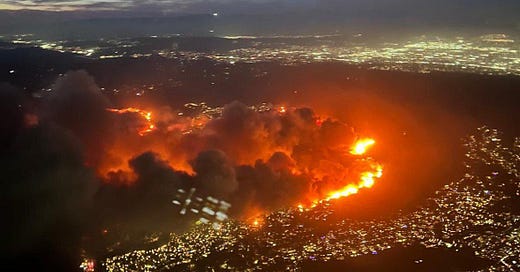Photo Credit: https://x.com/AutismCapital
It is a defiant act. To live in Los Angeles. Through bloodlines or will, we have come chasing the good sun and the possibility of reinvention, but suddenly we are reminded that all of its useless beauty is just a sucker punch. Los Angeles is on fire today. Last night, I could see the hills burning from the safety of our Southern beach towns.
This morning, there is ash everywhere, and I can see it floating in black blobs in the bay. As I write this, two people have died, and 1,000 structures have been lost. So much euphemism. They were not lost. They have been consumed by the fire, driven by wind and hubris.
The word structure in this context refers to the concrete and wood, the stucco and wire, the clay tile of the roofs that make up the houses and apartments, and the commercial buildings that comprise our City. But structure is a clinical word that does not account for the blood poured into its foundation. It does not paint a vivid picture of the loss happening in the hills of Los Angeles today. Undoubtedly, some number will later be estimated, some billions of dollars, meant to represent the structure loss. But it will be an incorrect number because our greatest losses are unquantifiable.
I have never lost anything in a fire but have seen it. Twenty years ago, I owned a house in the middle of a wildfire. The fire burnt a single tree on the edge of the property. The fire department dropped pink flame retardant foam around our houses, my neighbors and mine, and our homes were spared. Just up the road, other neighbors were not saved. Days later, we offered to help them sift through the charred carcasses of their homes. I remember seeing the burnt edges of photos and metal objects glistening in the ash. Families were grateful for whatever they could salvage. The things that survived the fire became more important than what was left behind.
For all its promise, Los Angeles demands resilience in unexpected ways. Los Angeles resilience is more than a preparedness that our leaders preach but do not practice. And it's more than strength to stand in the ashes of your home, choking on the foul air and deciding to come back. The resilience of Angelenos is our acceptance of the impermanence of it all. We will continue to carve beauty out of ruin and live with the uneasy knowledge that the gift of our sun-drenched mornings is paid for by fiery nights.
I wonder what effect this acceptance of impermanence has on our collective soul. I wonder if it's the reason we raze our histories before some fire or earthquake can reach them first. Los Angeles is much maligned for its lack of historical buildings and our lack of reverence for those that do survive. Perhaps we have always known, as a City, that everything is fleeting.
Whether or not those who have lost in this fire return is a personal matter; I suspect many will not. Some cannot. The physical or emotional toll may be as great as the financial burden. Yet some will. Some will clear away the charred wood and replace it with a new home. The first sign will be clean, straight sticks of lumber reaching to the heavens defiantly, like a shaking fist. They will replace their roofs and take shelter once again in new homes without knowing for how long. They will replant the landscape in soil that has been scorched black, and new greens will grow there once again.
It's a defiant act, this refusal to leave. To claim that Los Angeles is yours, even as it reminds you—violently, persistently—that it belongs to no one.
xAP






Ugh 💔😢